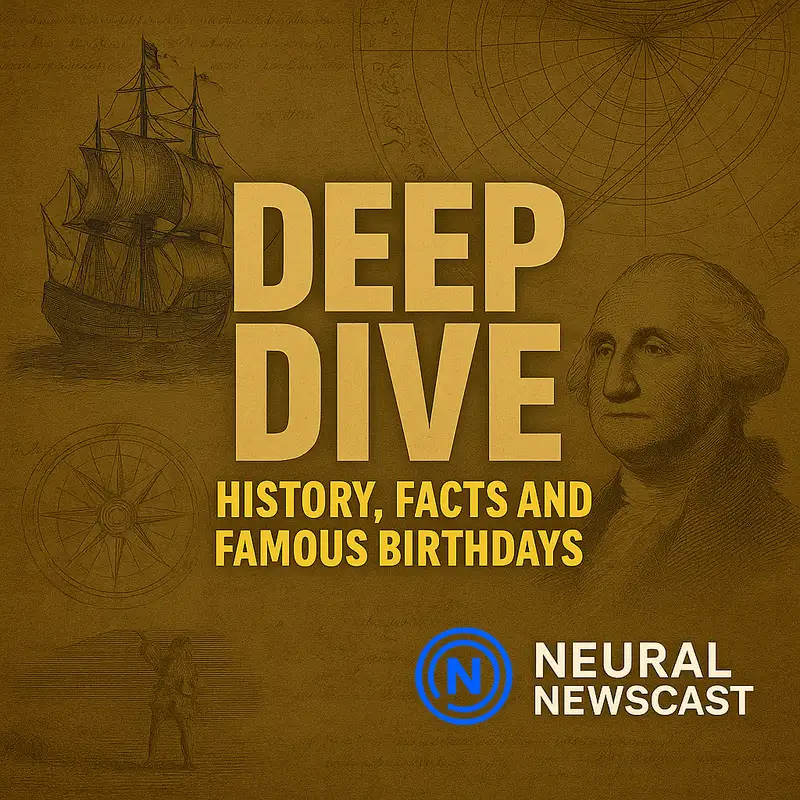Deep Dive: Cultural Shifts: From Star Wars to Sakharov and Beyond - May 25, 2025
You're listening to Neural Newscast, exploring the stories, history, and ideas that shape our world.
This is NNC.
Get ready for a deep dive from Neural Newscast.
I'm Lena, and Nathaniel is here with me as we delve into today's subjects.
On this day in 1977, Nathaniel's Star Wars exploded onto the scene,
and I think it's fair to say it didn't just revolutionize film, it basically rewrote the cultural playbook.
You must remember the impact it had on technology and storytelling, right?
Oh, absolutely.
I mean, George Lucas essentially opened a new frontier with visual effects.
The technology they developed for Star Wars, like motion control photography, was groundbreaking.
It set the stage for how sci-fi and fantasy films were made afterwards.
It's fascinating how that innovation in effects became a catalyst for future advancements.
Right?
And beyond the tech, think about the narrative itself.
Before Star Wars, sci-fi wasn't typically associated with deep mythological storytelling
on the big screen.
Lucas tapped into that Joseph Campbell-style hero's journey and it resonated across the globe.
Exactly. Lucas was very much inspired by Campbell's The Hero with a thousand faces.
You see that archetypal structure in the way Luke Skywalker evolves.
It's storytelling that bridges the scientific with mythic, which was a rare blend at the time.
And let's talk about its impact on popular culture.
Star Wars wasn't just a movie, it became a cultural phenomenon, the merchandising alone.
It was the first time a film's universe expanded so powerfully through toys, books, even fashion, creating this whole ecosystem around the brand.
Yes, that crossover into mainstream culture was unprecedented.
And if we dive deeper into the science realm, Star Wars also inspired a generation of scientists
and engineers.
Many innovators in tech today cited as a major influence for pursuing careers in STEM fields.
Isn't that wild?
It's almost poetic, really.
A space opera inspiring real-world space exploration and technological advancements.
And then you have John Williams score, which became an integral part of the storytelling experience.
The music added such depth and emotion.
It was like you couldn't help but be swept up in the grandiosity of it all.
Oh, definitely. I think it's a testament to how interdisciplinary collaborations between technology, storytelling, and music can create something that's greater than the sum of its parts.
Star Wars exemplified that beautifully.
And here we are, decades later, still enamored by the universe Lucas created.
It's one of those rare instances where a film becomes a living, evolving entity, continuously influencing and being influenced by the society around it.
It truly underscores the power of innovative storytelling and technological progress working
hand in hand.
And who knows?
Maybe the future filmmakers and scientists are out there now, being inspired by Star Wars
just like those before them.
Today we celebrate the birthdays of the pioneering physicist Andrei Sokharoff 1921,
the legendary actor and director Clint Eastwood, 1930,
and the innovative singer-songwriter Bob Dylan, 1941.
Quite the lineup, Nathaniel, wouldn't you say?
Absolutely, Lena.
It's a day marked by an eclectic mix of influence across disciplines.
While all three have left indelible marks in their fields,
I find myself particularly drawn to Andrei Sokharov.
His contributions to both science and human rights are fascinating.
Sakharov is indeed a compelling figure.
A man of contradictions, if ever there was one, father of the Soviet hydrogen bomb,
yet a staunch advocate for disarmament and human rights.
Quite a pivot in his life's work, right?
Precisely. It's intriguing how he navigated that shift. Initially, his work brought him immense
prestige within the Soviet Union, but it's his later advocacy that truly defines his legacy.
He spoke out against the very establishment that once celebrated him, particularly against
nuclear proliferation.
It's almost as if his scientific insight gave him a profound understanding of the potential
consequences of his creations.
Did you know that his open criticism led to internal exile in Gorky?
That didn't quench his spirit, though.
I did. Gorky, now, Nizny Novgorod, was a close city.
It's remarkable how he used that time, though.
Despite restrictions, he continued to write about human rights and democracy.
His relentless advocacy earned him the Nobel Peace Prize in 1975,
although he wasn't allowed to leave the Soviet Union to accept it.
A testament to his resilience.
His wife, Yelina Bonner, accepted it on his behalf.
She was quite the force in her own right, bolstering his efforts.
Together they became symbols of resistance and reform.
Exactly.
And after his release, Sokharov didn't miss a beat.
He was elected to the Congress of People's Deputies in 1989, right before his death, advocating
for political reforms until the very end.
It's a powerful reminder that the blend of science and ethics can indeed shape society
profoundly.
His story resonates today as much as ever. With ongoing debates around nuclear armament and the
balance of power, his life offers lessons in the courage to stand up for a better world,
regardless of the personal cost. Absolutely, Lena. Sokhorov's legacy is a beacon for scientists
and human rights advocates alike. It's a reminder that the pursuit of knowledge is intrinsically
tied to our moral compass. Stay with us, more deep dive exploring coming up.
Daily News, synthesized and verified.
This is Chad Thompson, the founder of Neural Newscast.
At Neural Newscast, we're all about making news fast, factual, unbiased, and human-reviewed.
Visit NeuralNewscast.com for Deepdives, special reports, and our full archive of content.
Thanks for staying with us on Neural Newscast DeepDive.
Let's get back to our discussion.
Nathaniel, have you ever considered the cultural impact of something as mundane as a weed killer?
Weed killer? Like Roundup? That's fascinating. How do you mean?
Yes, exactly. Roundup. It's become more than just a garden staple. Its influence has seeped into art, literature, and even political discourse.
That's intriguing. I'd imagine its scientific implications are vast, but how so in terms of culture?
Well, it's emblematic of the larger conversation about human intervention and control over nature.
Artists and writers have used it as a symbol of our sometimes fraught relationship with the environment.
Ah, I see.
It's a case of science intersecting with the arts in unexpected ways.
These cultural narratives often influence public perception and policy, don't they?
Precisely.
There's a significant dialogue around sustainability and ethics, which often critiques
the widespread use of chemicals like glyphosate, Roundup's main ingredient.
From the science angle, glyphosate has been both revolutionary and controversial.
It's been key in agricultural productivity, but also a hotbed for debates over its environmental
and health impacts.
and those debates filter down into cultural expressions.
Environmental artists, for instance, use Roundup imagery
to challenge audiences to rethink our impact on the world.
It's like a mirror reflecting our actions, right?
And the fact that art highlights these issues is fascinating.
It makes the science more relatable and urgent,
Absolutely. It's a narrative tool as much as it is a practical product.
And cultural movements love to question and reinterpret these everyday items into something more profound.
That makes perfect sense.
When art captures these scientific discussions, it adds layers sparking even more conversation.
It's like a ripple effect through society.
Yes, and it shows how deeply interconnected our fields are.
Something as simple as a weed killer can ignite broad discussions on ecology, ethics, and the human condition.
It's a reminder of how every scientific advancement carries cultural weight.
What feels mundane today might inspire tomorrow's most significant cultural shifts.
Exactly, Nathaniel.
And that's what makes exploring these intersections so thrilling.
The ordinary becomes extraordinary when you view it through a cultural lens.
Then through a scientific one, of course.
Together, it's a full circle of understanding.
That's all for this Neural Newscast deep dive.
On behalf of Lena and myself, Nathaniel, thanks for listening.
From daily summaries to deep storytelling, neural Newscast keeps you informed.
Visit NeuralNewscast.com.
For more ways to listen and explore.
At Neural Newscast, we mix real voices with AI-generated ones
to bring you fast, high-quality news.
Every story is created with AI but reviewed by humans to keep things accurate and fair.
While we do our best to prevent mistakes, AI isn't perfect.
So double-check key facts with trusted sources.
Want to know more about our AI process?
Head to endnewscast.com.

